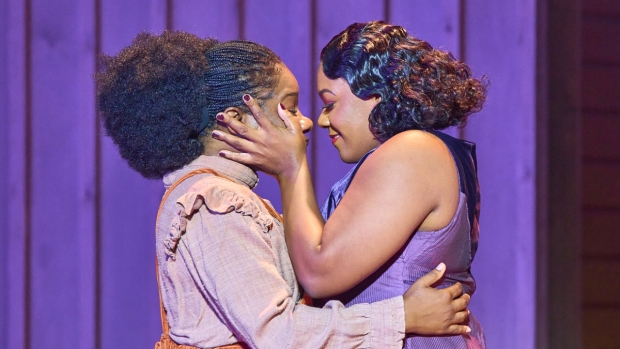”The Color Purple” at Birmingham Hippodrome and on tour – review

© Manuel Harlan
Based on Alice Walker’s 1983 Pulitzer Prize-winning novel, The Color Purple tells the story of Celie, a Black woman growing up in America’s Deep South during the first half of the 20th century.
When we first meet Celie, she is playing with her sister Nettie in a scene full of childish innocence but we soon learn that innocence has been cruelly betrayed. Celie’s life is one of sexual abuse at the hands of the man she believes is her father and, when he has had enough of her, he forces her into a marriage with Mister – a man who treats her like a slave and beats her.
The imbalance of that relationship is summed up when, more than a year into the marriage, Celie still has no idea what her husband’s name actually is.
Furthermore, her only ally, her sister, disappears and, unable to believe Nettie would willingly abandon her, Celie thinks she must be dead. But when her husband’s mistress Shug Avery comes to visit, Celie finds a new ally in an unexpected corner and discovers truths that have been hidden from her.
Me’sha Bryan lives and breathes the role of Celie. Initially childlike, we see her terrible suffering in Mister’s house and when she is finally able to turn her back on him, we all feel her sense of release. There is a real joy in Bryan which comes through in the latter half of the story, and boy can this woman sing, belting out her solos with heart and soul.
Ako Mitchell returns to his role as Mister, a man whose cruelty makes him easy to dislike. But this production has plenty of nuance so we also learn that he is a product of his own upbringing, behaving just as his father did because he knows no other way. And we see that he lives in a society where people love to gossip but are less willing to step in and help or intervene.
Bree Smith’s Shug Avery is popular and seductive but also flawed. Succeeding as a Black woman in a world where that success is highly unlikely, she uses her femininity to gain what she needs while fully aware of the risks to the strategy. Smith plays her with sensuality and seductiveness but importantly, also shows her vulnerable side.
There is a bitter-sweet subplot in the relationship between Mister’s son Harpo (Ahmed Hamad) and his wife Sofia (Anelisa Lamola). Here is a couple who defy the stereotypes, with a genuine love affair and a woman in the dominant position, but Sofia’s refusal to be cowed as a Black woman comes at a price.
With book by Marsha Norman and music and lyrics by Brenda Russell, Allee Willis and Stephen Bray, The Color Purple is very much song-driven and, particularly at the beginning where it is setting the scene and building character, it would benefit from a better balance between music and dialogue.
Alex Lowde’s designs and costumes set us firmly in the south with much of the action taking place on the porch while lighting and video designer Joshua Pharo gives us digital backdrops of crop fields – plus a good dusting of the colour purple.
Initially directed by Tinuke Craig, with the revival directed by Lakesha Arie-Angelo, the production is very much taken forward by story and the audience is rooting for Celie throughout – so much so that there are cheers when she finally stands her ground.
Despite its often weighty subject matter, the production features a good deal of humour – not least in a trio of village busybodies whose reflections are a modern take on the tradition of the Greek chorus.
Although set very much in its time and place, The Color Purple is a story with resonance for all times and places, with a strong message that determination and goodness will finally conquer. It is hard not to leave this show feeling moved – I’ll admit to shedding a tear or two at moments – by the spirit of human nature and the bonds of friendship and family.












